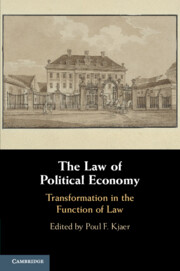Book contents
- The Law of Political Economy
- The Law of Political Economy
- Copyright page
- Dedication
- Contents
- Contributors
- Acknowledgements
- Abbreviations
- 1 The Law of Political Economy
- Part I Studying the Law of Political Economy
- Part II Transformations of the Law of the Globalising Economy
- Part III The Transformation of the Law of Political Economy in Europe
- Part IV Towards a New Law of Political Economy
- 12 The Future of Law – ‘Serial Law’?
- 13 After Governance?
- 14 The Transnational Dimension of Constitutional Rights
- 15 Counter-Rights
- Index
15 - Counter-Rights
On the Trans-Subjective Potential of Subjective Rights*
from Part IV - Towards a New Law of Political Economy
Published online by Cambridge University Press: 18 April 2020
- The Law of Political Economy
- The Law of Political Economy
- Copyright page
- Dedication
- Contents
- Contributors
- Acknowledgements
- Abbreviations
- 1 The Law of Political Economy
- Part I Studying the Law of Political Economy
- Part II Transformations of the Law of the Globalising Economy
- Part III The Transformation of the Law of Political Economy in Europe
- Part IV Towards a New Law of Political Economy
- 12 The Future of Law – ‘Serial Law’?
- 13 After Governance?
- 14 The Transnational Dimension of Constitutional Rights
- 15 Counter-Rights
- Index
Summary
In contrast to current versions of critical theory which in their attack on liberal-capitalist societies develop a more or less vague vision of a socialist society, Christoph Menke, - Frankfurt School third generation - in his brilliant monograph, Kritik der Rechte, Suhrkamp 2015 (A Critique of Rights) fights on two-fronts. He directs his critique not only against liberal-capitalist formations with their conglomerates of societal power, but also against socialist-communist formations with their totalising aggregation tendencies. Against both, he attempts to formulate a theory of the authentic political judgment, which is based upon “counter-rights” in a “new law”.
In the face of obvious deficiencies of both formations, this is a remarkable attempt to develop utopian ideas in politics and law. Building on these ideas, the author suggests is to go beyond individual counter-rights on which Menke focuses exclusively, and to articulate genuinely social counter-rights in three dimensions – in the communicative, the collective and the institutional dimension. What is more, they need to be developed in two directions. One direction is the attribution of counter-rights to collectives, organisations, social movements, networks, functional systems, not as substitutes for individual rights to resistance but as their supplements. The other direction is the pluralisation of counter-rights which Menke defines in a unitary manner. Counter-rights will need to be developed with a high degree of variation if they are supposed to overcome motivation constraints in various media of communication.
Keywords
- Type
- Chapter
- Information
- The Law of Political EconomyTransformation in the Function of Law, pp. 372 - 393Publisher: Cambridge University PressPrint publication year: 2020
- 6
- Cited by

